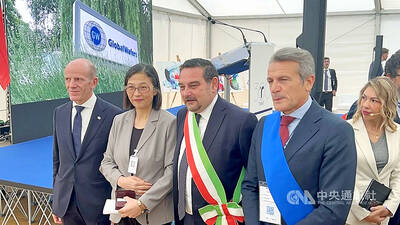Share prices of smartphone maker HTC Corp (宏達電) rose yesterday as it announced it will carry out a buyback plan to purchase up to NT$6.3 billion (US$197 million) worth of shares to “boost employee morale.”
A company board meeting late on Sunday night approved the share repurchase proposal to buy back 10 million shares at NT$526 to NT$631 per share between today and Sept. 12.
The buyback will account for 1.29 percent of the company’s total shares in circulation.
The shares will later be resold to company employees, according to the board meeting decision.
“The company wants to transfer the shares obtained from the repurchase scheme to the employees, a move we expect will boost employee morale,” an HTC spokeswoman said.
BRAIN DRAIN
While many market observers said that HTC is likely to face a brain drain of talented staff to its rivals due to fierce competition in the smartphone market, the spokeswoman said only that “the reason behind the share buyback is very simple. Do not over-analyze the situation.”
However, Edward Chen, an analyst with First Capital Management Ltd, said the company is expanding its business globally and that it is very important to find ways to keep its employees.
“The transfer of company shares from the buyback is a good way of keeping employees,” Chen said.
“HTC has an ambition to further polish its brand image in the global market and lifting employee morale and encouraging them to work hard is part of these efforts,” he said.
In the second quarter of this year, HTC posted NT$60.53 billion in sales on rising demand for high-end mobile phones such as Desire, Legend, Incredible and EVO, up about 60.6 percent from the first quarter and beating market expectations.
RECORD SALES
Last month alone, HTC sales hit a record high of NT$23.86 billion, up 4.98 percent from May.
“The company has healthy fundamentals and plenty of cash on hand. The share buyback is unlikely to affect its financial condition,” Chen said.
According to HTC, the company has about NT$68.2 billion in cash on hand.
Chen said the buyback scheme is expected to continue to lend strong support to the company’s share price.

RECYCLE: Taiwan would aid manufacturers in refining rare earths from discarded appliances, which would fit the nation’s circular economy goals, minister Kung said Taiwan would work with the US and Japan on a proposed cooperation initiative in response to Beijing’s newly announced rare earth export curbs, Minister of Economic Affairs Kung Ming-hsin (龔明鑫) said yesterday. China last week announced new restrictions requiring companies to obtain export licenses if their products contain more than 0.1 percent of Chinese-origin rare earths by value. US Secretary of the Treasury Scott Bessent on Wednesday responded by saying that Beijing was “unreliable” in its rare earths exports, adding that the US would “neither be commanded, nor controlled” by China, several media outlets reported. Japanese Minister of Finance Katsunobu Kato yesterday also

‘DRAMATIC AND POSITIVE’: AI growth would be better than it previously forecast and would stay robust even if the Chinese market became inaccessible for customers, it said Taiwan Semiconductor Manufacturing Co (TSMC, 台積電) yesterday raised its full-year revenue growth outlook after posting record profit for last quarter, despite growing market concern about an artificial intelligence (AI) bubble. The company said it expects revenue to expand about 35 percent year-on-year, driven mainly by faster-than-expected demand for leading-edge chips for AI applications. The world’s biggest contract chipmaker in July projected that revenue this year would expand about 30 percent in US dollar terms. The company also slightly hiked its capital expenditure for this year to US$40 billion to US$42 billion, compared with US$38 billion to US$42 billion it set previously. “AI demand actually

Jensen Huang (黃仁勳), founder and CEO of US-based artificial intelligence chip designer Nvidia Corp and Taiwan Semiconductor Manufacturing Co (TSMC, 台積電) on Friday celebrated the first Nvidia Blackwell wafer produced on US soil. Huang visited TSMC’s advanced wafer fab in the US state of Arizona and joined the Taiwanese chipmaker’s executives to witness the efforts to “build the infrastructure that powers the world’s AI factories, right here in America,” Nvidia said in a statement. At the event, Huang joined Y.L. Wang (王英郎), vice president of operations at TSMC, in signing their names on the Blackwell wafer to

Taiwan-based GlobalWafers Co., the world’s third largest silicon wafer supplier, on Wednesday opened a 12-inch silicon wafer plant in Novara, northern Italy - the country’s most advanced silicon wafer facility to date. The new plant, coded “Fab300,” was launched by GlobalWafers’ Italian subsidiary MEMC Electronics Materials S.p.A at a ceremony attended by Taiwan’s representative to Italy Vincent Tsai (蔡允中), MEMC President Marco Sciamanna and Novara Mayor Alessandro Canelli. GlobalWafers Chairwoman Doris Hsu (徐秀蘭) said the investment marked a milestone in the company’s expansion in Europe, adding that the Novara plant will be powered entirely by renewable energy - a reflection of its